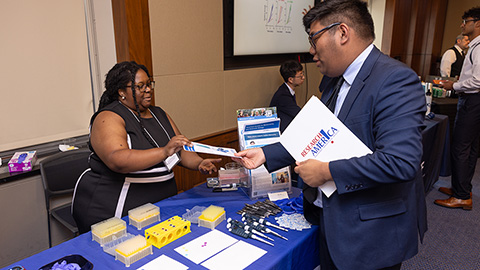ASBMB lauds parts of defense authorization that bolster HBCUs
The American Society for Biochemistry and Molecular Biology released a statement earlier this month commending Congress and President Joe Biden for their support of the Historically Black Colleges and Universities Research, Innovation, Security and Excellence Act, key provisions of which the president signed into law Dec. 23 as a part of the National Defense Authorization Act.
The bipartisan HBCU RISE Act was crafted in early 2022 to elevate the research status of HBCUs, which are historically underfunded.
“Supporting minority-serving institutions is key to improving equity across the American research enterprise and increasing retention of underrepresented minorities in STEM,” Sarina Neote, public affairs director of the ASBMB, said. “We’re thrilled to see this bill enacted into law.”
The new law compels U.S. Secretary of Defense Lloyd J. Austin III to fund outstanding scientific grant applications detailing plans to bolster HBCU research programs. The grants can be used for faculty professional development; undergraduate, graduate and postdoctoral fellow stipends; laboratory equipment and instrumentation; faculty and student recruitment and retention; and research facility construction and modernization.
HBCUs are important resources that bring scientific opportunities to underrepresented groups and drive diversification of the STEM workforce. While they comprise only 3% of the nation’s higher education institutions, HBCUs are leaders in producing Black college graduates who go on to earn STEM doctorates.
The Carnegie classification is a framework to categorize colleges and universities based on research-output, with R1 research institutions achieving the greatest research activity. The NDAA-funded pilot program aims to increase the research capacity of R2 HBCUs so that they can qualify for R1 status.
The ASBMB expressed support for the original bill in a statement back in April and this month credited legislative co-authors U.S. Sens. Chris Van Hollen, D-Md., and Thom Tillis, R-N.C., and U.S. Rep. Alma Adams, D-N.C., for their hard work to ensure that final version of the defense authorization included research funding for HBCUs.
Van Hollen said in a press release about the original bill: “Maryland’s HBCUs provide a quality education, a unique experience and an enriching environment for thousands of students.” He added: “Investing more in their success — and the success of our students — is an investment in our future.”
Neote said the ASBMB hopes to see more bipartisan and bicameral work supporting the American STEM enterprise and equity within it.

Enjoy reading ASBMB Today?
Become a member to receive the print edition four times a year and the digital edition monthly.
Learn moreGet the latest from ASBMB Today
Enter your email address, and we’ll send you a weekly email with recent articles, interviews and more.
Latest in Policy
Policy highlights or most popular articles

Embrace your neurodivergence and flourish in college
This guide offers practical advice on setting yourself up for success — learn how to leverage campus resources, work with professors and embrace your strengths.

ASBMB honors Lawrence Tabak with public service award
He will deliver prerecorded remarks at the 2025 ASBMB Annual Meeting in Chicago.

Summer internships in an unpredictable funding environment
With the National Institutes of Health and other institutions canceling summer programs, many students are left scrambling for alternatives. If your program has been canceled or delayed, consider applying for other opportunities or taking a course.

Black excellence in biotech: Shaping the future of an industry
This Black History Month, we highlight the impact of DEI initiatives, trailblazing scientists and industry leaders working to create a more inclusive and scientific community. Discover how you can be part of the movement.

ASBMB releases statement on sustaining U.S. scientific leadership
The society encourages the executive and legislative branches of the U.S. government to continue their support of the nation’s leadership in science.

ASBMB and advocacy: What we accomplished in 2024
PAAC members met with policymakers to advocate for basic scientific research, connected some fellow members with funding opportunities and trained others to advocate for science.

